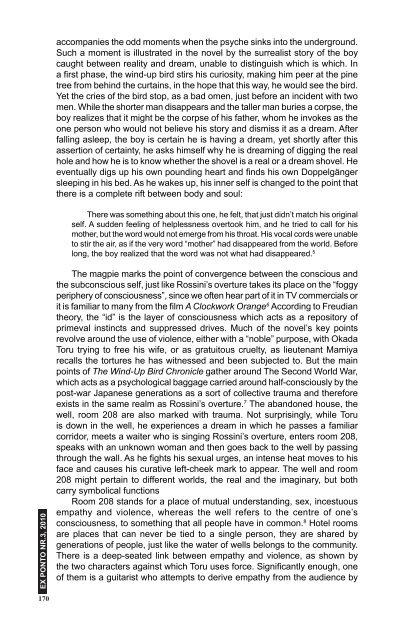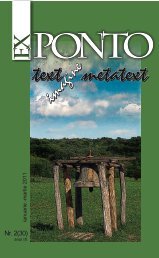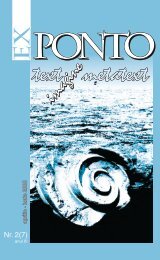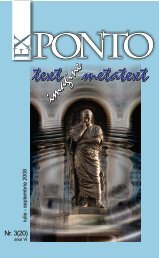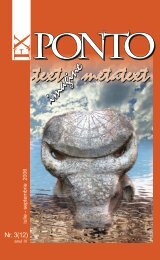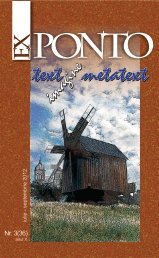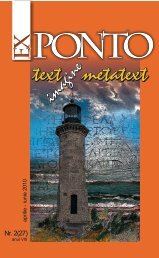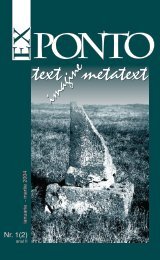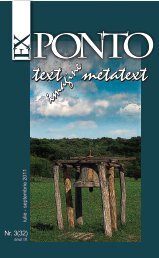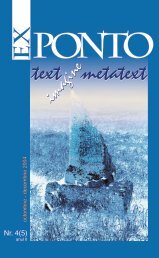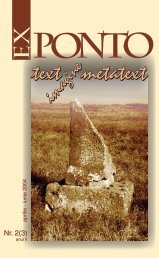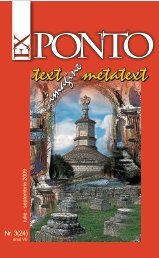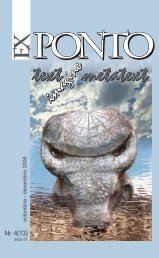Nr. 3 (28) anul VIII / iulie-septembrie 2010 - ROMDIDAC
Nr. 3 (28) anul VIII / iulie-septembrie 2010 - ROMDIDAC
Nr. 3 (28) anul VIII / iulie-septembrie 2010 - ROMDIDAC
Create successful ePaper yourself
Turn your PDF publications into a flip-book with our unique Google optimized e-Paper software.
accompanies the odd moments when the psyche sinks into the underground.<br />
Such a moment is illustrated in the novel by the surrealist story of the boy<br />
caught between reality and dream, unable to distinguish which is which. In<br />
a first phase, the wind-up bird stirs his curiosity, making him peer at the pine<br />
tree from behind the curtains, in the hope that this way, he would see the bird.<br />
Yet the cries of the bird stop, as a bad omen, just before an incident with two<br />
men. While the shorter man disappears and the taller man buries a corpse, the<br />
boy realizes that it might be the corpse of his father, whom he invokes as the<br />
one person who would not believe his story and dismiss it as a dream. After<br />
falling asleep, the boy is certain he is having a dream, yet shortly after this<br />
assertion of certainty, he asks himself why he is dreaming of digging the real<br />
hole and how he is to know whether the shovel is a real or a dream shovel. He<br />
eventually digs up his own pounding heart and finds his own Doppelgänger<br />
sleeping in his bed. As he wakes up, his inner self is changed to the point that<br />
there is a complete rift between body and soul:<br />
There was something about this one, he felt, that just didn’t match his original<br />
self. A sudden feeling of helplessness overtook him, and he tried to call for his<br />
mother, but the word would not emerge from his throat. His vocal cords were unable<br />
to stir the air, as if the very word “mother” had disappeared from the world. Before<br />
long, the boy realized that the word was not what had disappeared. 5<br />
Ex Ponto nr.3, <strong>2010</strong><br />
The magpie marks the point of convergence between the conscious and<br />
the subconscious self, just like Rossini’s overture takes its place on the “foggy<br />
periphery of consciousness”, since we often hear part of it in TV commercials or<br />
it is familiar to many from the film A Clockwork Orange 6 According to Freudian<br />
theory, the “id” is the layer of consciousness which acts as a repository of<br />
primeval instincts and suppressed drives. Much of the novel’s key points<br />
revolve around the use of violence, either with a “noble” purpose, with Okada<br />
Toru trying to free his wife, or as gratuitous cruelty, as lieutenant Mamiya<br />
recalls the tortures he has witnessed and been subjected to. But the main<br />
points of The Wind-Up Bird Chronicle gather around The Second World War,<br />
which acts as a psychological baggage carried around half-consciously by the<br />
post-war Japanese generations as a sort of collective trauma and therefore<br />
exists in the same realm as Rossini’s overture. 7 The abandoned house, the<br />
well, room 208 are also marked with trauma. Not surprisingly, while Toru<br />
is down in the well, he experiences a dream in which he passes a familiar<br />
corridor, meets a waiter who is singing Rossini’s overture, enters room 208,<br />
speaks with an unknown woman and then goes back to the well by passing<br />
through the wall. As he fights his sexual urges, an intense heat moves to his<br />
face and causes his curative left-cheek mark to appear. The well and room<br />
208 might pertain to different worlds, the real and the imaginary, but both<br />
carry symbolical functions<br />
Room 208 stands for a place of mutual understanding, sex, incestuous<br />
empathy and violence, whereas the well refers to the centre of one’s<br />
consciousness, to something that all people have in common. 8 Hotel rooms<br />
are places that can never be tied to a single person, they are shared by<br />
generations of people, just like the water of wells belongs to the community.<br />
There is a deep-seated link between empathy and violence, as shown by<br />
the two characters against which Toru uses force. Significantly enough, one<br />
of them is a guitarist who attempts to derive empathy from the audience by<br />
170


